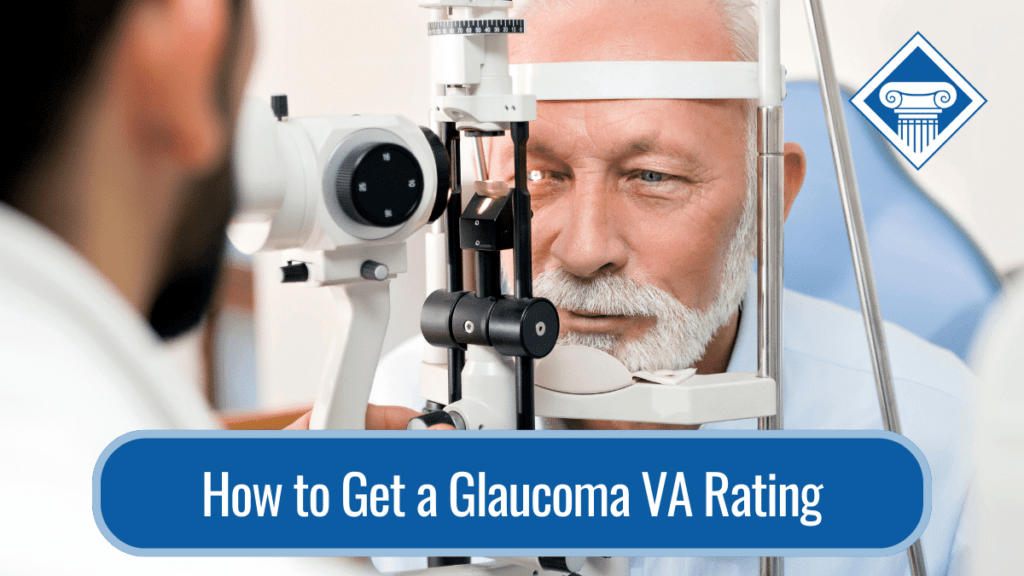Many veterans are diagnosed with glaucoma, a condition that damages the optic nerve and can lead to vision loss. Eye injuries incurred during military service or service-connected health issues that cause high blood pressure are some of the most common causes of glaucoma in veterans. Veterans with this condition will want to understand how they can receive a glaucoma VA disability rating.
Talk to Us About Your Claim:
(812) 426-7200
In this article about the glaucoma VA rating:
Veterans and glaucoma
Eye problems are a common issue among veterans. Approximately one and a half million veterans develop eye conditions, and more than a quarter of a million of those same veterans are diagnosed with glaucoma. Glaucoma is an eye disease that causes damage to the optic nerve that connects your eyes to your brain. Glaucoma damage often results from insufficient blood flow.
There are several types of glaucoma, two of the most common being open-angle glaucoma and angle-closure glaucoma. The most common type, open-angle glaucoma, occurs when the eye’s drainage canals become clogged over time, leading to increased eye pressure and optic nerve damage. Angle-closure glaucoma is less common and happens when a swollen iris blocks fluid from properly draining in the eye and quickly increases eye pressure.

Unfortunately, there are usually no warning signs or early symptoms to indicate damage to the optic nerve. The first symptom is generally losing peripheral vision unless a health professional detects it during a routine eye exam. Half of people with glaucoma are unaware they have it until significant vision loss occurs.
If glaucoma is caught early, vision loss can be slowed. Unfortunately, after any damage has occurred, treatment and monitoring will always be needed.
“If you were injured while serving this country and are reading this review, I encourage you to contact Woods and Woods right away. They are always standing ready to assist veterans in need.”

J.B., a Navy veteran in Virginia
Glaucoma VA rating
The VA rates glaucoma using the General Rating Formula for Diseases of the Eye. Sometimes, glaucoma will be specifically noted under diagnostic codes 6012 (angle-closure glaucoma) and 6013 (open-angle glaucoma). Veterans taking continuous medication for their glaucoma will receive a minimum rating of 10%.
The VA is instructed to consider the level of visual impairment or incapacitating episodes and base the award on whichever has the higher rating. An incapacitating episode in this context is an eye condition that is severe enough to require a visit to a provider specifically for treatment purposes.
The VA ratings also consider the number and frequency of treatments such as systemic immunosuppressants or biologic agents; intravitreal or periocular injections; laser treatments; or other surgical interventions.
| Description | VA Rating | Monthly payment (vet only) |
|---|---|---|
| With documented incapacitating episodes requiring 7 or more treatment visits for an eye condition during the past 12 months | 60% | $1,3161.88 |
| With documented incapacitating episodes requiring at least 5 but less than 7 treatment visits for an eye condition during the past 12 months | 40% | $755.28 |
| With documented incapacitating episodes requiring at least 3 but less than 5 treatment visits for an eye condition during the past 12 months | 20% | $338.49 |
| With documented incapacitating episodes requiring at least 1 but less than 3 treatment visits for an eye condition during the past 12 months | 10% | $171.23 |

How is glaucoma service connected?
Glaucoma can be linked to military service in several ways. One common connection is a direct service connection from any form of trauma to the eyes during service. This could be blunt force trauma during combat or training exercises, injuries from explosive blasts, or even chemical exposure that affects the eyes. These types of injuries can cause damage to the optic nerve or lead to increased eye pressure, both of which are risk factors for developing glaucoma.
Glaucoma can also be connected as a secondary condition if it arises from other service-connected health issues, such as diabetes or high blood pressure, or from medications and surgeries used to treat service-related conditions. For example, a veteran who develops glaucoma as a result of service-connected cataract surgery may receive a glaucoma VA rating.
Veterans over 60 and those with high or low blood pressure are at an increased risk of getting glaucoma. Some medicines taken at night for high blood pressure can cause a drop in blood pressure, which can negatively affect the optic nerve.
Finally, veterans with untreated sleep apnea also face a higher risk of glaucoma because their optic nerves might not get enough oxygen
C&P exam for glaucoma
Veterans seeking disability benefits for glaucoma will likely have to undergo a compensation & pension (C&P) exam. The examination process generally starts by dilating the pupils with eye drops. At the exam, a medical professional will perform a vision test, paying close attention to the peripheral edges of your vision where many first notice problems. Eye pressure will also be tested.
It’s important to explain your vision issues in detail at the exam. Even if you feel rushed, make sure all your symptoms are recorded, and note how your current medical issues may be connected to your military service.
TDIU for glaucoma
A veteran can be awarded total disability based on individual unemployability (TDIU) benefits if they can’t maintain substantially gainful employment due to their service-connected conditions.
Severe, untreated glaucoma can lead to vision loss, which would undoubtedly make it difficult or even impossible to drive, operate heavy machinery, or even work on a computer.
It’s also important to remember that most veterans eligible to receive TDIU have more than one service-connected health condition contributing to their inability to work. In fact, the average veteran receiving VA disability has about six conditions they are rated for. Even a low rating for glaucoma may help build your TDIU case.
TDIU pays at the same level as a 100% disability rating, even when the veteran’s combined rating is below 100%.
Veterans will typically be eligible for TDIU if they have:
- At least one service-connected disability rated at 60% or more disabling OR
- Two or more service-connected disabilities with at least one rated at 40% or more disabling and a combined rating of 70% or more
“After trying and failing multiple times over many years to get widow’s compensation from the VA, I turned to Woods and Woods… I am so glad we found them. They are wonderful and very good at what they do. They are very professional and keep you updated and formed throughout the process.”

J.C., a veteran’s widow in Utah
How Woods and Woods can help with your VA disability claim
If you have service-connected conditions that affect your ability to live and work, you deserve your full VA disability compensation. Contact Woods and Woods today for a free consultation to see how we can help. You only pay us if we win.
Talk to Us About Your Claim:
(812) 426-7200
FREQUENTLY ASKED QUESTIONS
If your glaucoma developed due to an eye injury during service or as a result of other conditions related to your service, such as hypertension or diabetes, it may be considered service-connected.
The VA assigns glaucoma VA ratings between 10% and 60% under the General Rating Formula for Diseases of the Eye. Veterans taking continuous medication for glaucoma receive a minimum rating of 10%.

Neil Woods
VA disability lawyer
Woods and Woods
Neil Woods is the firm’s owner and president. He received his law degree from Western Michigan University.



